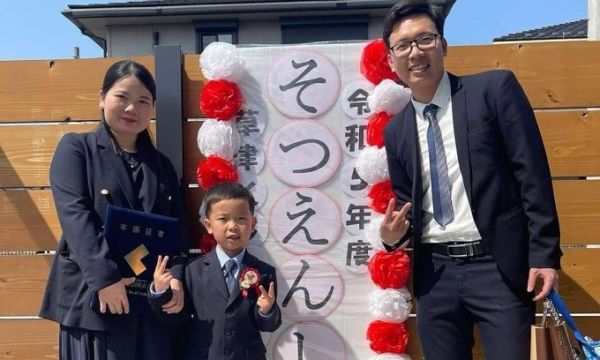
Now 33, she had moved to Japan with her husband six years ago for his job, leaving behind their three-year-old son.
In 2022 they finally took him in Japan. Determined to preserve his cultural identity, the couple vowed to never let him forget his native language. “I brought first-grade Vietnamese textbooks and letter-tracing notebooks to teach him at home,” she says.
|
Thu, her husband, and their son at his preschool graduation in 2023. Photo courtesy of the family |
Their son quickly adapted to his new environment, picking up Japanese within months and soon surpassing his mother in fluency.
But as his Japanese improved, she grew increasingly concerned that his Vietnamese was slipping away. At home the couple spoke only Vietnamese with him.
They hired a tutor for two weekly sessions and she personally reviewed lessons with him two evenings a week. However, between his school and her work, they had little time together in the evenings. Now fluent in Japanese, the boy rarely uses Vietnamese.
Once, he tried to share a story with his parents but had to do so entirely in Japanese because he did not know how to explain it in Vietnamese. While her husband understood, she could not follow.
She now fears a growing language barrier may disconnect her from her son and isolate him from relatives in Vietnam. “I wonder whether this trade-off is simply too much,” she says.
Thu’s concerns are shared by thousands of Vietnamese parents abroad, including the more than 7,000 members on the Facebook group “Teaching Your Children Vietnamese.”
Linguist Hoang Thi Thu Thuy, co-founder of the online Vietnamese school “Love Vietnamese” in Brisbane, Australia, runs the group.
She says the demand among overseas Vietnamese families to help their children retain the language is growing fast. Her school currently teaches around 1,000 students aged four to 16 in more than 30 countries.
Many parents also join the lessons. These are often second-generation emigrants who were not taught Vietnamese properly and now have to start over. “Online learning has made it easier, and so more parents are now signing up their children,” Thuy says.
For her, mastering the local language is crucial for children abroad, but having Vietnamese is just as important. “Not every country has its own unique language. Ours does, and it is something we should be proud of.”
Having lived overseas for many years, she has witnessed the heart-breaking consequences of loss of language. In one case a family spoke only English at home, but later the elderly mother developed Alzheimer’s and could only remember Vietnamese, she says. “The daughter and mother became like strangers, unable to communicate. The daughter was heartbroken and full of regret.”
In Florida in the U.S. Quynh Phan has seen similar situations: children unable to speak Vietnamese distancing themselves from parents who are not fluent in English.
She says Vietnamese children overseas who cannot speak their mother tongue often struggle with identity. “They blend into the multicultural world around them but do not know where their roots lie.”
When her daughter Bi was born in 2011, she was determined to teach her Vietnamese so she could talk with her grandparents, who had moved to the U.S. later in life and spoke little English. “I wanted her to be proud of her roots,” she says.
 |
|
Bi, daughter of Quynh Phan, participating in a summer camp in Ho Chi Minh City in early 2025. Photo courtesy of the family |
However, balancing work and parenting proved difficult. When Bi was four, Quynh played Vietnamese music in the car. The girl used to say: “I hate listening to Vietnamese.”
Quynh says: “I knew something was wrong and told my husband we needed to act immediately.” From then on, Quynh cut back on work and enrolled Bi in Vietnamese classes every Sunday. In the evenings she spoke only Vietnamese at home.
But progress was slow, and so her husband, a doctor in the U.S., took two months off in the summer of 2016 for the family to visit Vietnam.
They stayed in a resort in Hue and enrolled Bi in a public kindergarten to immerse her in a Vietnamese-speaking environment. At first, she used gestures to communicate. Gradually she began forming sentences, though some confused her teachers. By the end of summer she was speaking fluently and received several awards and certificates.
Since then Quynh has brought her daughter back to Vietnam every summer. In March this year Bi completed a summer camp in HCMC. “Now she understands 95% of what I say in Vietnamese,” Quynh says.
Recognizing the growing demand for Vietnamese education among overseas families, Thuy and her husband, linguist Dr. Nguyen The Duong, launched their online language school.
In 2019, Duong returned to Vietnam and published a book titled “Tieng Viet Cua Em” (My Vietnamese) for Vietnamese children living abroad.
Thuy says maintaining Vietnamese while living overseas is not easy but is possible with commitment and persistence.
She encourages families to start early, which makes the process smoother. She recommends setting a rule at home to always speak Vietnamese with children. Even if only one parent is Vietnamese, that parent still use the language consistently, she says.
Parents are also advised to read Vietnamese books with their children for 10–15 minutes daily and explore Vietnamese music, podcasts, audiobooks, stories, and poetry.
“Parents should connect with other Vietnamese families where they live and participate in cultural activities to immerse their children in the language and traditions of Vietnam.”
Last month Thu’s mother-in-law moved to Japan to help care for her grandson. The grandmother now takes the lead in practicing Vietnamese with her grandson.
The family also socializes with other Vietnamese families, listens to music and watches historical films and programs together. “I believe that with this approach, no matter where my children go, they will still speak Vietnamese and be proud of being Vietnamese.”